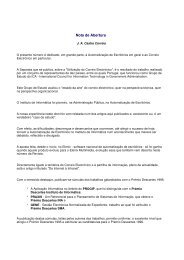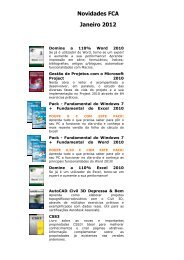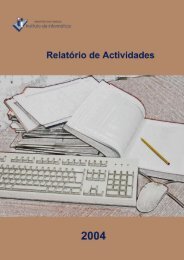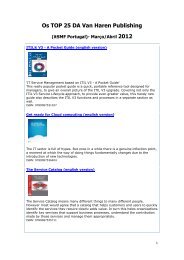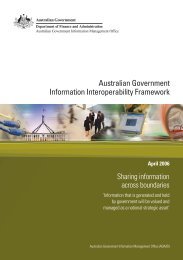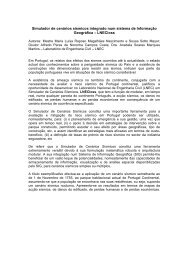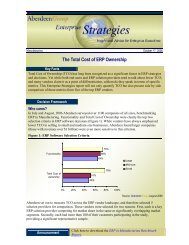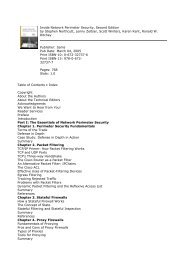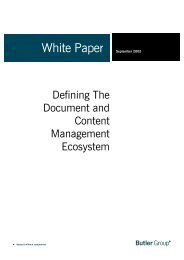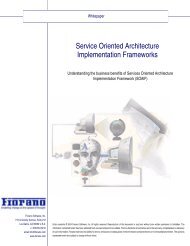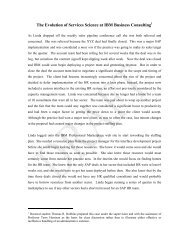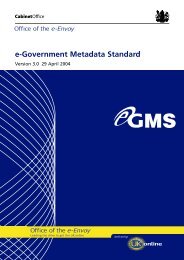OECD Peer Review of E-Government in Denmark - ePractice.eu
OECD Peer Review of E-Government in Denmark - ePractice.eu
OECD Peer Review of E-Government in Denmark - ePractice.eu
Create successful ePaper yourself
Turn your PDF publications into a flip-book with our unique Google optimized e-Paper software.
<strong>in</strong>volvement <strong>in</strong> e-government therefore very much depends on three th<strong>in</strong>gs: 1) their own personal<br />
<strong>in</strong>terest <strong>in</strong> the subject; 2) the relevance it has to their portfolios; and 3) the extent to which their<br />
permanent secretary makes it a priority issue for discussion.<br />
Although the absence <strong>of</strong> collective responsibility may pose some risk <strong>of</strong> uneven m<strong>in</strong>isterial<br />
commitment to e-government, there is no evidence that <strong>in</strong>troduc<strong>in</strong>g a collective responsibility (which<br />
would require constitutional change) would alter or improve the e-government results <strong>Denmark</strong> is<br />
achiev<strong>in</strong>g. Similarly, there is no evidence to suggest that establish<strong>in</strong>g a m<strong>in</strong>isterial portfolio for<br />
e-government would have any useful impact on e-government results. Indeed, given the deliberate<br />
position<strong>in</strong>g <strong>of</strong> e-government <strong>in</strong> a wider context, allocation <strong>of</strong> responsibility to a powerful m<strong>in</strong>ister<br />
could have a negative impact on e-government. Certa<strong>in</strong>ly, <strong>in</strong>terviews conducted for this review did not<br />
suggest that current arrangements for m<strong>in</strong>isterial <strong>in</strong>volvement <strong>in</strong> e-government are <strong>in</strong>effective.<br />
Instead <strong>of</strong> rely<strong>in</strong>g on collective m<strong>in</strong>isterial responsibility, leadership <strong>of</strong> e-government is built<br />
around collegiality at the level <strong>of</strong> the Jo<strong>in</strong>t Board <strong>of</strong> e-<strong>Government</strong>. Participation <strong>in</strong> e-government is<br />
generally not mandatory for government organisations. Instead, <strong>Denmark</strong> has positioned e-government<br />
as almost a moral responsibility for each organisation, which they should embrace <strong>in</strong> support <strong>of</strong><br />
deliver<strong>in</strong>g Danes a high-quality and efficient public sector. Interviews showed that, while this shared<br />
commitment has been develop<strong>in</strong>g s<strong>in</strong>ce 2001, it has really become established s<strong>in</strong>ce the revision <strong>of</strong> the<br />
e-government strategy <strong>in</strong> 2004. Organisations are now better able to understand and commit to what<br />
they need to do as part <strong>of</strong> the overall e-government programme, due to a comb<strong>in</strong>ation <strong>of</strong> clearer<br />
e-government goals and measures and an improved way <strong>of</strong> fram<strong>in</strong>g and mak<strong>in</strong>g decisions at the level<br />
<strong>of</strong> the Jo<strong>in</strong>t Board.<br />
Additionally, some m<strong>in</strong>isters currently play another e-government leadership role through<br />
participation <strong>in</strong> the E-government Dialogue Forum. Established <strong>in</strong> 2001, this forum meets twice a year<br />
to enable an exchange <strong>of</strong> <strong>in</strong>formation and views between m<strong>in</strong>isters, the chairs <strong>of</strong> the county and<br />
municipal government associations, labour and <strong>in</strong>dustry associations, and ICT <strong>in</strong>dustry groups such as<br />
ITEK. This forum enables m<strong>in</strong>isters to be <strong>in</strong>volved with e-government outside <strong>of</strong> the stand<strong>in</strong>g<br />
relationship they have with it through <strong>of</strong>ficials, and creates the opportunity for stakeholder<br />
engagement <strong>in</strong> the ongo<strong>in</strong>g development <strong>of</strong> e-government. It is notable, however, that there is no<br />
participation <strong>in</strong> this forum by any groups directly represent<strong>in</strong>g citizens’ <strong>in</strong>terests <strong>in</strong> government<br />
Overall, the e-government results that <strong>Denmark</strong> is achiev<strong>in</strong>g, coupled with the favourable<br />
impressions <strong>of</strong> the role that m<strong>in</strong>isters play <strong>in</strong> lead<strong>in</strong>g e-government, <strong>in</strong>dicate that no change to the<br />
current arrangement <strong>of</strong> political responsibilities is necessary – at least <strong>in</strong> terms <strong>of</strong> ga<strong>in</strong><strong>in</strong>g the<br />
commitment <strong>of</strong> government organisations to the e-government programme.<br />
Adm<strong>in</strong>istrative leadership<br />
At the whole-<strong>of</strong>-government level, <strong>Denmark</strong> is provid<strong>in</strong>g strong leadership for e-government, and<br />
<strong>of</strong>ficials express high levels <strong>of</strong> approval and satisfaction with the way e-government responsibilities<br />
are structured and co-ord<strong>in</strong>ated. While <strong>Denmark</strong> does not have a specific m<strong>in</strong>isterial portfolio for<br />
e-government, it has placed overall responsibility for Danish ICT policy (cover<strong>in</strong>g citizens, bus<strong>in</strong>esses<br />
and the public sector) with the M<strong>in</strong>istry <strong>of</strong> Science, Technology and Innovation. In 2001, follow<strong>in</strong>g a<br />
review <strong>of</strong> public sector progress develop<strong>in</strong>g e-government, the M<strong>in</strong>istry <strong>of</strong> F<strong>in</strong>ance established both<br />
the Jo<strong>in</strong>t board <strong>of</strong> e-<strong>Government</strong> and the Danish Digital Task Force to <strong>in</strong>crease the focus on overall<br />
e-government leadership, plann<strong>in</strong>g and co-ord<strong>in</strong>ation. These bodies now work on e-government <strong>in</strong><br />
close co-operation with the MVTU.<br />
72



